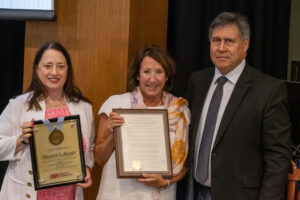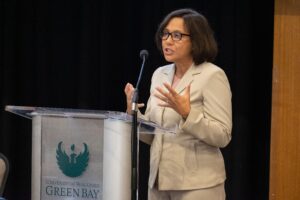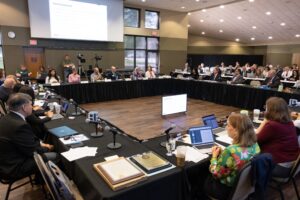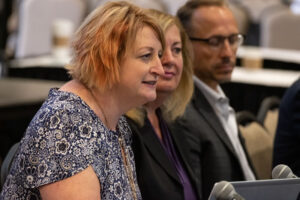GREEN BAY, Wis. – As part of the University of Wisconsin System’s commitment to expanding the number of college graduates in the state, there is growing recognition that providing students with a range of support services is vital to their success.
Student support services run the gamut from financial aid, academic planning, mental and behavioral health services, to career counseling, pre-college bridge programs, and more.
At Friday’s Board of Regents meeting, attention was focused on the significant role of advising with a panel of faculty, staff and students sharing their experience.
“Academic advising has evolved a lot over the years,” said Senior Academic Planner Angela Kellogg, with UW System’s Office of Student Success. While advising traditionally has centered on course selection and registration, Kellogg said it is now more holistic, proactive and developmental. It may include academic planning; major and career exploration; basic needs and mental health referrals; academic success support; transition, engagement and sense of belonging; and connection to resources and opportunities on campus.
“Advising now is much more than transactional, it’s transformational,” Kellogg said. “The key is that student-advisor relationship.”
Advising today is grounded in teaching and learning and involves holistic, proactive, and data-informed approaches to support students on their path towards a degree, she said. Proactive advising provides customized outreach and early interventions to keep students on track and ensure limited resources are directed to those students with the greatest needs. Research indicates students who feel connected to an institution are more likely to persist.
- See the UW System PowerPoint on advising
Kellogg acknowledged today’s advisors also face significant challenges. While caseloads vary by institution, it is not uncommon for an advisor to work with 200-300 students, or more. “Student needs also have greatly increased as well as what we ask advisors to do,” she added.
Recruiting and retention are the primary issues impacting the advising community. Faced with high caseloads and relatively low salaries, turnover is high – and applicant pools to fill openings are much smaller than previously. “The impact of this is critical and affects the continuity and quality of advising for students,” Kellogg said.
“Student needs are growing, advising resources are not,” Kellogg said. “We need to affirm that need to support advising and keep the talent that is changing student lives in the system.”
Lisa Michalec, Director of Academic and Career Advising at UW-Stevens Point, told Regents that less than 50% of advising appointments are related to course registration. “This time is devoted to getting to know students, their interests, their values, and to answer questions. We need to know if they’re running into any challenges with financial aid, housing, parking. We troubleshoot,” she said.
“We also listen for the unasked questions, the ones they should be asking but aren’t,” Michalec said. “The goal is to help students gather information to make informed decisions and to have a sense of belonging to the campus.”
Darrel Renier, Director of the Office of Academic Advising & Retention at UW-Green Bay, reiterated the expanded scope of what advisors are now expected to deal with. “In the past, the issues would be about work; now we’re hearing about homelessness, food shortages, mental health. Our students also are starting to earn degrees at different points of their lives.”
Renier noted that UW-Green Bay has moved to a new advising model in recent years with a professional academic advisor who works with a student through their entire college career through graduation. “Our students have one invested advisor through the journey, and only have to tell their story once,” he said. Key to the model’s success are the cross-campus connections to other support services to provide a continuum of care.
Dr. Jim Feldman, Director of the Environmental Studies Program at UW Oshkosh, spoke of the role of faculty in advising students and helping them to pick courses and navigate through their majors. Beyond course questions, however, faculty advisors are also involved in handling questions about what a student’s professional and personal goals are, what opportunities may be available in clubs, internships, study abroad, and more.
“It’s about how to push outside a comfort zone to take advantage of what’s available in college,” Feldman said. “It’s in advising that we get to build personal relationships to talk with students about the people they’re becoming.”
Two students shared their own personal experiences with advising support.
Averie Menger, a senior at UW-Green Bay, told Regents that beyond the expected academic planning, her advisor stepped up at a time she really needed extra support, when physical health issues started to also affect her mental health. “I was overwhelmed,” Menger said. “She made me realize it wasn’t a bad thing to admit I needed to step back from other responsibilities on my plate. She found ways to lighten my schedule and take the weight off my shoulders … while also making sure I was still meeting my goals.”
Estefania Alonso, now a senior biology major on the MD/PhD track, transferred to UW-Parkside early in the pandemic. A first-generation college student, she said she previously felt lost and didn’t know where to turn for help. After meeting with an advisor at UW-Parkside, “I felt instantly connected and felt that my presence at UW-Parkside mattered,” she said. “(My advisor) helped me find the best path, classes, and ways to get involved, ways to network, and ways to meet more students. She made me feel like I could take these chances and just go for it. I am so grateful to have someone like her in my corner.”
Regent President Karen Walsh thanked the panelists for sharing their experience and said it affirmed the importance of continued investment in student support services.
Regent Jill Underly, State Superintendent of Public Instruction, said K-12 faces similar challenges with low pay, stress, high turnover, and difficulties in recruiting advisors. “We need to reckon with that as a society,” she said. “As a state, we need to invest. This is future of our state and we have to invest in these services.”
Universities are focused on student success
Five UW universities contributed to a video highlighting the ways they are assisting students, guiding students, encouraging students, and making their campuses more appealing to students.
“I hope this video is a reminder that we are here to serve the students and we must keep them at the front of our minds in every decision we make, and in every action we take,” said UW System President Jay Rothman.
Talent engagement and workforce readiness in the New North
Rebecca Deschane, Vice President of Talent Development with the New North, moderated a panel discussion on workforce challenges facing northeast Wisconsin and the state overall, and how the UW System can help address these challenges moving forward.
“We know UW schools are one of our key talent drivers and leading our state in ways that are very critical,” she said.
Ann Franz, Executive Director of the NEW Manufacturing Alliance, reiterated the value of its partnerships with UW-Green Bay and UW Oshkosh. “I speak all over the country and in Europe and I tell people our secret sauce is these educational institutions, and how we’re willing to work together,” she said.
Franz said about one-quarter of jobs in Northeast Wisconsin are in manufacturing, and connections with universities are critical in meeting the needs for more engineers and more engineering technology. She said providing universities with real-time data identifying where the careers and highest needs are can help development of programs responsive to those needs.
“Having real data in our area, we can make wise decisions and be proactive instead of reactive,” Franz said.
Matthew Valiquette, Executive Director of the Bay Area Workforce Development Board, told Regents workforce development has significant changed.
“Ten years ago, workforce development was very linear. We’d have lines out the doors at job centers,” Valiquette said. “Today, that approach has never been more ineffective.”
With extremely low unemployment numbers and challenging demographics, “we have abandoned our passive approach,” he said. “We have to be far more nimble and community-based. As a workforce board, we have to find ways to better connect the disconnected.”
Sachin Shivaram, with the Wisconsin Center for Manufacturing and Productivity, noted that it can be difficult for an 18-year-old to turn down a $25/hour job, but to continue economic opportunity, additional education and upscaling, including micro-credentials, need to be presented as a valuable option.
“It’s about how do we make sure people are still connecting to lifelong learning opportunities so they don’t get stymied in career advancement,” said Deschane, noting that credit for prior learning, dual enrollment programs, and micro-credentials all have potential.
Former Board colleague recognized

Regent Tracey Klein receives her resolution of appreciation from Regent President Karen Walsh and Regent Edmund Manydeeds
Regents recognized the service and contributions of Regent Emerita Tracey Klein, who stepped down from the Board in June. She had served on the Board since 2016.
“I have a deep and abiding love for UW. It is my story,” Klein said. “I was a kid from a small town … who ended up UW-Madison at age 17. I thought the portal of the universe had opened to me. The friendships, the learning, I had such a good education. I could sit at any table in the world with anyone. I think that’s the gift of the whole UW System.”
In other business, the Board of Regents:
- Heard a resolution of appreciation for UW-Green Bay’s hosting of the August 2022 Board of Regents meeting;
- Approved the UW System Status Report on Large/High-Risk Information Technology Projects;
- Approved UW System’s contractual agreement with HelioCampus, Inc. for a suite of data science and analytics services that will operationalize the Enterprise Analytics Platform project approved by the Board in June;
- Approved UW-Green Bay’s request for a Master of Public Administration, a professional degree that provides students with hands-on and theoretical preparation for a career in public service;
- Approved UW-Madison’s request for a Master of Science in Engineering Management, which elevates an existing option within the Master of Engineering to a stand-alone degree;
- Approved UW-Parkside’s request for a Master of Science in Physician Assistant. The program responds to market and student demands for physician assistants in southeast Wisconsin and its three partner health care systems: Advocate-Aurora Hospital, Ascension Hospital, and Froedtert South Hospital; and
- Approved the Office of Internal Audit fiscal year 2023 budget and resource plan, as presented by Chief Audit Executive Lori Storz. Storz reported that Fiscal 2022 was a productive year for the Office of Internal Audit, which completed virtually all of its planned audits as well as more than 10 special projects requested by the Board of Regents and management.
Photo Credit: Daniel Moore/UW-Green Bay
Photo gallery | August 18 (day 1) news summary
The University of Wisconsin System Board of Regents will next meet on September 29-30, 2022, at UW-Eau Claire.



